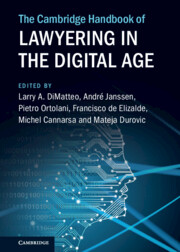Book contents
- The Cambridge Handbook of Lawyering in the Digital Age
- The Cambridge Handbook of Lawyering in the Digital Age
- Copyright page
- Contents
- Detailed Contents
- Figures
- Contributors
- Preface
- 1 Lawyering in the Digital Age
- Part I Effects of Technology on Legal Practice
- Part II Legal Tech and ADR
- Part III Legal Tech in Consumer Relations and Small Claims
- Part IV Legal Tech and Public Law
- Part V Legal Ethics and Societal Values Confront Technology
- Part VI Fate of the Legal Professions
- 19 Lawyering Somewhere between Computation and the Will to Act
- 20 Surviving the Digital Transformation
- 21 Road Forward
20 - Surviving the Digital Transformation
A Method for Lawyers to Approach Legal Tech
from Part VI - Fate of the Legal Professions
Published online by Cambridge University Press: 18 November 2021
- The Cambridge Handbook of Lawyering in the Digital Age
- The Cambridge Handbook of Lawyering in the Digital Age
- Copyright page
- Contents
- Detailed Contents
- Figures
- Contributors
- Preface
- 1 Lawyering in the Digital Age
- Part I Effects of Technology on Legal Practice
- Part II Legal Tech and ADR
- Part III Legal Tech in Consumer Relations and Small Claims
- Part IV Legal Tech and Public Law
- Part V Legal Ethics and Societal Values Confront Technology
- Part VI Fate of the Legal Professions
- 19 Lawyering Somewhere between Computation and the Will to Act
- 20 Surviving the Digital Transformation
- 21 Road Forward
Summary
Today, during the fourth industrial revolution, law firms are navigating in a somewhat changing landscape. Traditional legal practice and the ways of doing business in providing legal services is under pressure to change. The pressure comes from other law firms and increasingly self-sufficient in-house counsels who are gradually handling more and more legal matters internally. Companies and their in-house counsels are demanding more specialized services and alternative pricing structures other than the traditional practice of billing by the hour. This demand is one consequence of the fourth industrialization that includes the evolution of various forms of digitization, automation, machine learning, AI, and other technologies. As any other business, law firms are not exempt from the effects of such technologies. If anything, law firms will experience significant disruptive effects on how they do business and the types of services they provide. This is mostly due to the impact of emerging technologies on changing business models, as well as the content of the demand and needs of clients, in ways that were unthinkable twenty years ago.
Keywords
- Type
- Chapter
- Information
- The Cambridge Handbook of Lawyering in the Digital Age , pp. 358 - 371Publisher: Cambridge University PressPrint publication year: 2021



